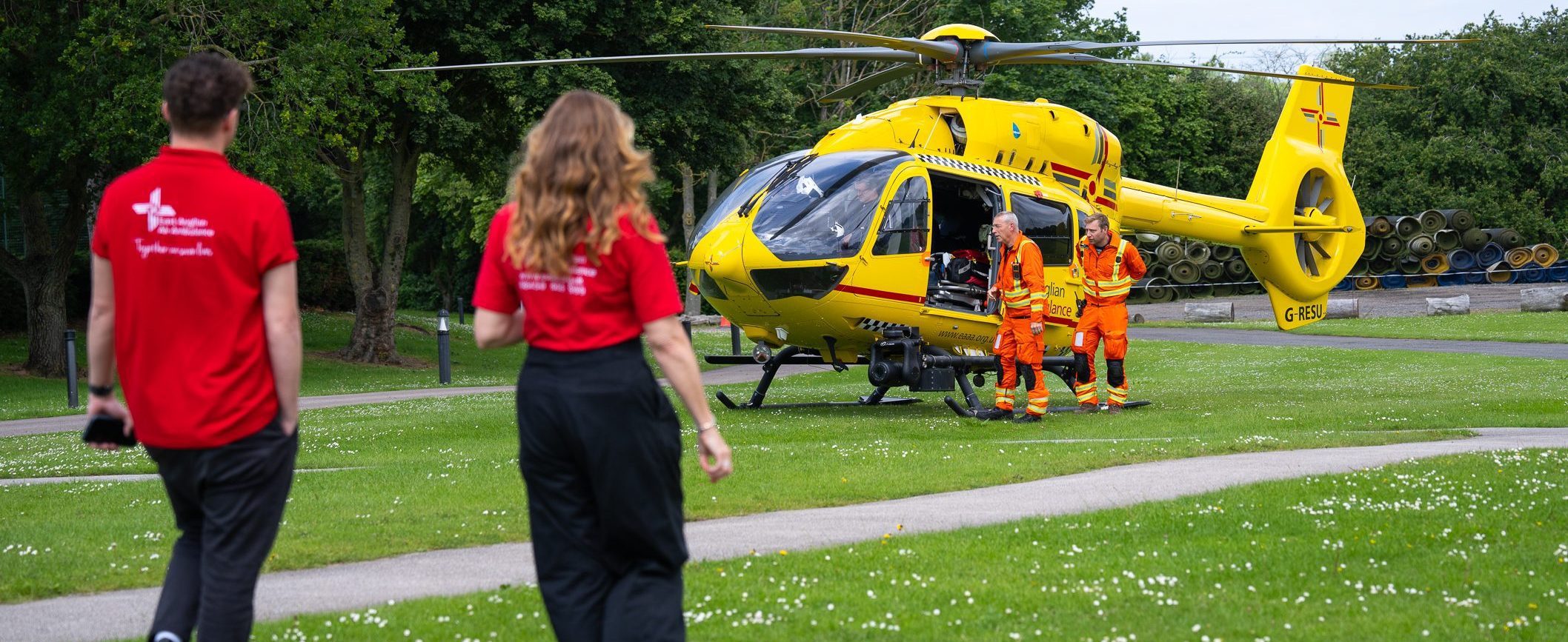Our supporter promise
East Anglian Air Ambulance is registered with the Fundraising Regulator, and we are committed to following the Fundraising Promise and Fundraising Code of Practice, ensuring our fundraising is legal, open, honest and respectful.
Our promise to donors and supporters of EAAA is:
- We will adhere to the Fundraising Code of Practice.
- We will monitor fundraisers, volunteers and third parties working with us to raise funds, to ensure that they comply with the Code of Fundraising Practice and with this Promise.
- We will comply with the law as it applies to charities and fundraising.
- We will display the Fundraising Regulator badge on our fundraising material to show we are committed to good practice.
- We will be clear, honest and open.
- We will tell the truth and we will not exaggerate.
- We will do what we say we are going to do with donations we receive.
- We will be clear about who we are and what we do.
- We will give a clear explanation of how you can make a gift and change a regular donation.
- Where we ask a third party to fundraise on our behalf, we will make this relationship and the financial arrangement transparent.

- We will be able to explain our fundraising costs and show how they are in the best interests of our cause if challenged.
- We will ensure our complaints process is clear and easily accessible.
- We will provide clear and evidence-based reasons for our decisions on complaints.
- We will be respectful.
- We will respect your rights and privacy.
- We will not put undue pressure on you to make a gift. If you do not want to give or wish to cease giving, we will respect your decision.
- We will have a procedure for dealing with people in vulnerable circumstances and it will be available on request.
- Where the law requires, we will get your consent before we contact you to fundraise.
- If you tell us that you don’t want us to contact you in a particular way we will not do so.
- We will work with the Telephone, Mail and Fundraising Preference Services to ensure that those who choose not to receive specific types of communication will not do so.
- We will be fair and reasonable.

- We will treat donors and the public fairly, showing sensitivity and adapting our approach depending on your needs.
- We will take care not to use any images or words that intentionally cause distress or anxiety.
- We will take care not to cause nuisance or disruption to the public.
- We will be accountable and responsible.
- We will manage our resources responsibly and consider the impact of our fundraising on our donors, supporters and the wider public.
- If you are unhappy with anything we’ve done whilst fundraising, you can contact us to make a complaint. We will listen to feedback and respond appropriately to compliments and criticism we receive.
- We will maintain a complaints policy, a copy of which is available on our website.
- Our complaints policy will let you know how to contact the Fundraising Regulator in the event that you feel our response is unsatisfactory.
- We will monitor and record the number of complaints we receive each year and share this data with the Fundraising Regulator on request


Fundraising Code of Practice
East Anglian Air Ambulance abides by the Fundraising Code of Practice developed and managed by the Fundraising Regulator.
The Fundraising Code or Practice aims to:
- Promote a consistent, high standard of fundraising.
- Make sure charitable institutions, their governing bodies and fundraisers know what is expected of them.
- Set out the standards we use when considering complaints.
- Provide a benchmark for organisations and fundraisers to assess their practices against so they can identify necessary training and monitor and set policy priorities for their fundraising.
- Develop a culture of honesty, openness and respect between fundraisers and the public.

The following four values support all standards in the code and are followed by East Anglian Air Ambulance.
Legal: All fundraising must meet the requirements of the law.
Open: Fundraisers must be open with the public about their processes and must be willing to explain (where appropriate) if they are asked for more information.
Honest: Fundraisers must act with integrity and must not mislead the public about the cause they are fundraising for or the way a donation will be used.
Respectful: Fundraisers must demonstrate respect whenever they have contact with any member of the public.

Additional Fundraising Principles at EAAA
In addition to our commitment to the Fundraising Promise and Fundraising Code of Practice, East Anglian Air Ambulance will also:
- Ensure best value with the money we raise, so our crews can focus on improving patient outcomes and continually doing the best for our patients and their families.
- Ensure our fundraisers, commercial partners and third parties will follow the EAAA approach to fundraising, uphold our values, and we will fundraise ethically and responsibly.
- Look after your data, store it securely and respect your rights, privacy and preferences. We will never sell or share your data commercially. Please see our policy on data protection.
- Administer and process your donations efficiently putting them to work quickly.
- Thank you appropriately – we believe everyone who supports us deserves our thanks and the thanks of our patients.
- Commit to keep you informed about how your donations and support are helping us to save lives and will respond to questions openly and honestly.
- Plan for a secure long-term future; by having cash reserves (invested prudently) equivalent to a year’s operating costs. The interest we receive from these investments goes towards our operating costs.
- Accept and welcome money from a wide range of public and private sector partners and from the general public, including individual supporters, churches and religious groups, trusts and foundations, corporations and statutory bodies.
- Decline donations to EAAA from sources (including individuals) that we deem to be disreputable, have potential to harm our reputation or are involved in activities that are at odds with EAAA’s mission and values.
- Be committed to managing safeguarding across fundraising activity and ensure sensitivity to the needs of diverse groups of supporters and volunteers and protect those who are vulnerable or at risk. See EAAA’s safeguarding policy for more details.
Please contact us on 03450 669 999, info@eaaa.org.uk or write to: Feedback, EAAA, Helimed House, Hangar 14, Gambling Close, Norwich Airport, Norwich, Norfolk, NR6 6EG to send feedback or if you have any questions about our fundraising promise or activity.